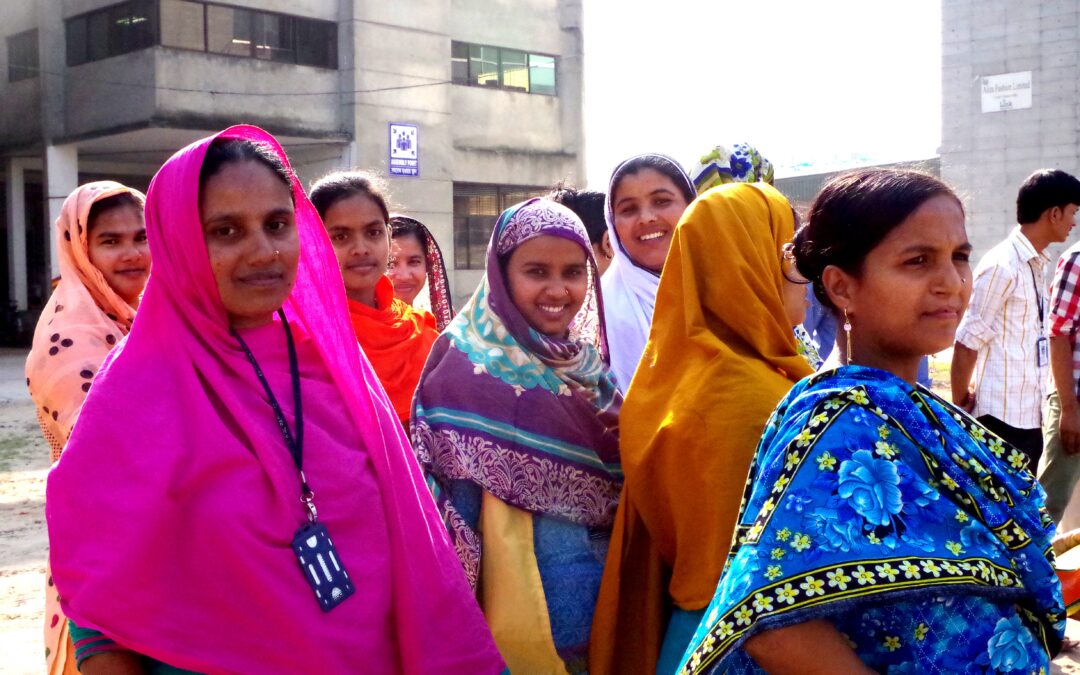A new internal Solidarity Center survey finds that, although Bangladesh claims the global lead in eco-friendly ready-made garment (RMG) manufacturing, government officials, factory owners and global fashion brands are not adequately addressing unhealthy working conditions, dangerous pollutants in the factory-adjacent communities in which garment workers are trapped by poverty wages, long working hours, or the negative effects of garment manufacturing on the environment.
Even in so-called green factories, “different stages of garments production may have serious impact on the physical and mental health and safety of the workers—emanating from yarn dust, excessive heat, use of chemicals, accidents, communicable diseases, lack of basic amenities and excessive workload,” says report author University of Dhaka International Relations Professor Dr. Syeda Rozana Rashid Rashid.
Bangladesh is the world’s top global sourcing location for international fashion brands. Of the country’s estimated 5,000 garment factories, in 2022 only 155 were certified as Leadership in Energy and Environmental Design (LEED) green factories.
A comprehensive green solution, finds the report, requires engagement with workers and their unions as social partners in the design and implementation of environmental practices that also improve conditions for workers through collective bargaining and policy development. Partnership with workers and their unions will promote properly implemented climate-protection laws, policies and processes that better protect RMG workers from unhealthy and unsafe workplaces, factory-adjacent community members from garment production pollutants, and all citizens from climate change impacts, such as flooding and drought.
Also, to protect their health and well-being, garment workers must earn wages sufficient to pay for housing located away from their jobs, and work hours that make transportation from greater distance possible. More than 4 million people work in the RMG sector, most of whom are young women living near the factory where they work.
“The area is full of odorous waste and chemicals,” says a union leader about workers’ living conditions in her community.
“Even local drinking water takes different colors due to the nature of different chemicals disposed of in the river. Situations become intolerable during the rainy season when roads are overflown by the toxic water under heavy rain. Workers get infected by skin diseases.”
The Bangladesh government has declared three Dhaka rivers biologically “dead” due to the untreated effluent flowing into them.
Interviews with 20 union members and leaders, and other experts from Dhaka and Gazipur, Savar and Chattogram regions also found that:
- Not all green factories are labor rights compliant.
- Garment workers’ vulnerability to environmental degradation and climate change will increase until their basic rights and needs are addressed by government and employers.
- The communities surrounding RMG facilities are significantly impacted in terms of health, quality of life and, in many cases, by associated impacts on their livelihoods from farming and fishing.
- Suffering due to excessive heat has become pervasive in RMG factories due to climate change, especially in the hot summer season, where lack of ventilation increases workers’ risk of being infected with communicable diseases, including COVID-19.
- Many factories will not allow workers to organize, impeding their education on how production, climate change impacts and environmental degradation are linked to their health and well-being.
- Global fashion brands largely do not take responsibility or accountability for environmental degradation, instead putting the responsibility on suppliers.
- Although global fashion brands use their code of conduct as a voluntary policy tool to focus on international standards, they mostly ignore climate issues and their impact on workers and their communities.
- The impact of climate change on factory workers is overlooked by formal inspection and monitoring mechanisms.
- Union respondents cannot engage global buyers in pressuring local producers to implement measures to improve workers’ living conditions.
- Without implementation demands and effective implementation processes, global brands’ prescribed eco-friendly standards appear to exist for appearances only in a process known as “greenwashing.”
“The factory is not green for the workers. We see a rosy picture; we hear nice stories. In reality, you would hardly hear workers’ voices in a green factory,” reports a union leader.
Bangladesh’s RMG sector accounts for 84 percent of the country’s exports. RMG exports more than doubled from 2011 through 2019—from $14.6 billion to $33.1 billion.
With long-term experience in people-centered policy and legislative rights-based advocacy, workers and their unions in Bangladesh are uniquely positioned to push forward a rights-based climate agenda as well as participate in a global climate justice movement.
“Without a union to safeguard workers’ interests and freedom of expression, no factory can properly be considered green,” says Sonia Mistry, Solidarity Center climate change and just transition global lead.

